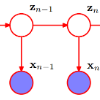The Hidden Markov Model (HMM) is one of the most widely used statistical models for sequential data analysis. One of the key reasons for this versatility is the ability of HMM to deal with missing data. However, standard HMM learning algorithms rely crucially on the assumption that the positions of the missing observations \emph{within the observation sequence} are known. In the natural sciences, where this assumption is often violated, special variants of HMM, commonly known as Silent-state HMMs (SHMMs), are used. Despite their widespread use, these algorithms strongly rely on specific structural assumptions of the underlying chain, such as acyclicity, thus limiting the applicability of these methods. Moreover, even in the acyclic case, it has been shown that these methods can lead to poor reconstruction. In this paper we consider the general problem of learning an HMM from data with unknown missing observation locations. We provide reconstruction algorithms that do not require any assumptions about the structure of the underlying chain, and can also be used with limited prior knowledge, unlike SHMM. We evaluate and compare the algorithms in a variety of scenarios, measuring their reconstruction precision, and robustness under model miss-specification. Notably, we show that under proper specifications one can reconstruct the process dynamics as well as if the missing observations positions were known.
翻译:暂无翻译


